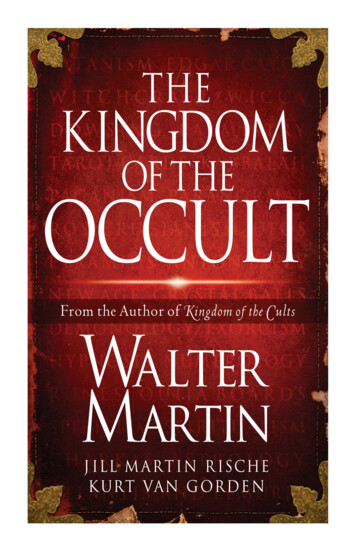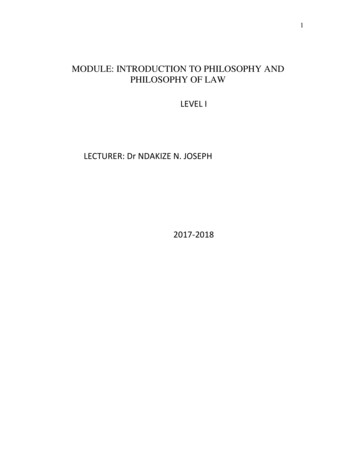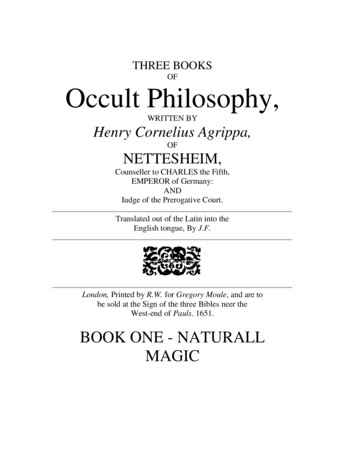
Transcription
THREE BOOKSOFOccult Philosophy,WRITTEN BYHenry Cornelius Agrippa,OFNETTESHEIM,Counseller to CHARLES the Fifth,EMPEROR of Germany:ANDIudge of the Prerogative Court.Translated out of the Latin into theEnglish tongue, By J.F.London, Printed by R.W. for Gregory Moule, and are tobe sold at the Sign of the three Bibles neer theWest-end of Pauls. 1651.BOOK ONE - NATURALLMAGIC
IndexThe life of Henry Cornelius Agrippa, Knight. . 6To my most honorable, and no less learned Friend, Robert Childe, Doctor ofPhysick. . 7[Agrippa] To the Reader. . 8To R. P. D. Iohn Trithemius, an Abbot of Saint James in the Suburbs ofHerbipolis, Henry Cornelius Agrippa of Nettesheym sendeth greeting. . 10John Trithemius, Abbot of Saint James of Herbipolis, formerly of Spanhemia, tohis Henry Cornelius Agrippa of Nettesheim, health and love. . 11To the Reverend Father in Christ, and most Illustrious Prince, Hermannus, Earlof Wyda, by the Grace of God Archbishop of the holy Church of Colonia,Prince Elector of the holy Romane Empire, and Chief Chancellor through Italy,Duke of Westphalia, and Angaria, and descended of the Legate of the holyChurch of Rome, one of the Vicar Generals Court, Henry Cornelius Agrippa ofNettes-heym, sendeth greeting. . 13Chap. i. How Magicians Collect vertues from the three-fold World, is declaredin these three Books. . 16Chap. ii. What Magick is, What are the Parts thereof, and how the Professorsthereof must be Qualified. 17Chap. iii. Of the four Elements, their qualities, and mutuall mixtions. . 19Chap. iv. Of a three-fold consideration of the Elements. . 20Chap. v. Of the wonderfull Natures of Fire, and Earth. . 21Chap. vi. Of the wonderfull Natures of Water, Aire, and Winds. 22Chap. vii. Of the kinds of Compounds, what relation they stand in to theElements, and what relation there is betwixt the Elements themselves, and thesoul, senses, and dispositions of men. 26Chap. viii. How the Elements are in the Heavens, in Stars, in Divels [devils], inAngels, and lastly in God himself. . 27Chap. ix. Of the vertues of things Naturall, depending immediatly uponElements. 28Chap. x. Of the Occult Vertues of things. . 29Chap. xi. How Occult Vertues are infused into the severall kinds of things byIdea's, through the help of the Soul of the World, and rayes of the Stars: andwhat things abound most with this Vertue. . 30
Chap. xii. How it is that particular Vertues are infused into particularIndividuals, even of the same Species. . 31Chap. xiii. Whence the Occult Vertues of things proceed. . 32Chap. xiv. Of the Spirit of the World, what it is, and how by way of medium itunites occult Vertues to their subjects. . 34Chap. xv. How we must find out, and examine the Vertues of things by way ofsimilitude. 35Chap. xvi. How the operations of several Vertues pass from one thing intoanother, and are communicated one to the other. . 36Chap. xvii. How by enmity and friendship the vertues of things are to be tryed,and found out. . 37Chapter xviii. Of the Inclinations of Enmities. . 39Chapter xix. How the Vertues of things are to be tryed and found out, which arein them specifically, or in any one Individuall by way of speciall gift. . 40Chapter xx. That naturall Vertues are in some things throughout their wholesubstance, and in other things in certain parts, and members. . 41Chapter xxi. Of the Vertues of things which are in them only in their life time,and such as remain in them even after their death. . 42Chapter xxii. How inferior things are subjected to superior bodies, and how thebodies, the actions, and dispositions of men are ascribed to Stars, and Signes. . 43Chapter xxiii. How we shall know what Stars naturall things are under, and whatthings are under the Sun, which are called Solary. . 44Chapter xxiv. What things are Lunary, or under the power of the Moon. . 46Chapter xxv. What things are Saturnine, or under the power of Saturne. . 47Chapter xxvi. What things are under the power of Jupiter, and are called Jovial. 48Chapter xxvii. What things are under the power of Mars, and are called Martial. . 49Chapter xxviii. What things are under the power of Venus, and are calledVenereall. . 49Chapter xxix. What things are under the power of Mercury, and are calledMercuriall. 50Chapter xxx. That the whole sublunary World, and those things which are in it,are distributed to Planets. . 50Chapter xxxi. How Provinces, and Kingdomes are distributed to Planets. . 51Chapter xxxii. What things are under the Signes, the fixed Stars, and theirImages. . 52Chapter xxxiii. Of the Seals, and Characters of Naturall things. . 53Chapter xxxiv. How by Naturall things, and their vertues we may draw forth,and attract the influencies, and vertues of Celestiall bodies. . 55
Chapter xxxv. Of the Mixtions of naturall things, one with another, and theirbenefits. . 56Chapter xxxvi. Of the Union of mixt things, and the introduction of a morenoble form, and the Senses of life. . 57Chapter xxxvii. How by some certain naturall, and artificiall preparations wemay attract certain Celestiall, and vitall Gifts. . 58Chapter xxxviii. How we may draw not only Celestiall, and vitall, but alsocertain Intellectuall, and divine gifts from above. . 59Chap. xxxix. That we may by some certain matters of the world stir up the Godsof the world, and their ministring spirits. . 60Chap. xl. Of bindings, what sort they are of, and in what wayes they are wont tobe done. . 60Chap. xli. Of Sorceries, and their power. . 61Chap. xlii. Of the wonderful vertues of some kinds of Sorceries. . 62Chap. xliii. Of Perfumes, or Suffumigations, their manner, and power. . 64Chap. xliv. The Composition of some fumes appropriated to the Planets. . 66Chap. xlv. Of Collyries, Unctions, Love-Medicines, and their vertues. . 67Chapter xlvi. Of naturall alligations, and suspensions. . 68Chapter xlvii. Of Rings, and their compositions. . 69Chapter xlviii. Of the vertue of places, and what places are sutable to every Star. . 70Chapter xlix. Of Light, Colours, Candles, and Lamps, and to what Stars, Houses,and Elements severall colours are ascribed. . 71Chapter l. Of Fascination, and the Art thereof. . 73Chapter li. Of certain observations, producing wonderfull Vertues. . 74Chapter lii. Of the Countenance, and Gesture, the Habit, and Figure of the Body,and to what Stars any of these do answer; whence Physiognomy, andMetoposcopy, and Chyromancy [Chiromancy], Arts of divination, have theirgrounds. . 75Chapter liii. Of Divination, and its kinds. . 77Chapter liiii. Of divers certain Animals, and other things which have asignification in Auguria's [auguries]. . 78Chapter lv. How Auspica's are verified by the light of Naturall instinct, and ofsome rules of finding of it out. . 82Chapter lvi. Of the Sooth sayings of Flashes, and Lightenings, and howMonstrous, and prodigious things are to be interpreted. . 86Chapter lvii. Of Geomancy, Hydromancy, Aeromancy, Pyromancy, fourDivinations of Elements. . 87
Chapter lviii. Of the reviving of the dead, and of sleeping, and wanting victualsmany years together. . 89Chapter lix. Of Divination by Dreams. . 91Chapter lx. Of Madness, and Divinations which are made when men are awake,and of the power of a Melancholy humor, by which Spirits are sometimesinduced into mens bodies. . 91Chapter lxi. Of the forming of Man, of the external Senses, and also the Inward,and the Mind: of the threefold appetite of the Soul, and passions of the Will. 94Chapter lxii. Of the Passions of the Mind, their Original [origin], difference, andkinds. . 96Chapter lxiii. How the passions of the mind change the proper body, bychanging the Accidents, and moving the spirit. . 96Chapter lxiv. How the Passions of the mind change the body by way of imitationfrom some resemblance; Also of the transforming, and translating of men, andwhat force the imaginative power hath not only over the body, but the soul. . 97Chapter lxv. How the Passions of the Mind can work out of themselves uponanothers Body. . 99Chapter lxvi. That the Passions of the mind are helped by a Celestiall season,and how necessary the Constancy of the mind is in every work. . 100Chapter lxvii. How mans mind may be joyned with the mind, and Intelligenciesof the Celestials, and together with them impress certain wonderfull vertuesupon inferiour things. . 101Chapter lxviii. How our mind can change, and bind inferiour things to thatwhich it desires. . 102Chapter lxix. Of Speech, and the vertue of Words. . 102Chapter lxx. Of the vertue of proper names. . 103Chapter lxxi. Of many words joyned together, as in sentences, and verses, and ofthe vertues, and astrictions of charms. . 104Chapter lxxii. Of the wonderful power of Inchantments [Enchantments]. . 105Chapter lxxiii. Of the vertue of writting [writing], and of making imprecations,and inscriptions. . 107Chapter lxxiv. Of the proportion, correspondency, reduction of Letters to theCelestiall Signs, and Planets, according to various tongues, and a Table shewingthis. . 107
The life of Henry Cornelius Agrippa, Knight.This introduction is not found in the 1533 edition.Enry Cornelius Agrippa, Descended from a noble Family of Netteshimin Belgia, Doctor of the Laws and Physick [medicine], Master of theRols, and Judge of the spirituall Court, from his youth he applyed hisminde to learning, and by his happy wit obtained great knowledge inall Arts and Sciences; afterwards also he followed the Army of thePrinces, and for his valor was created Knight in the Field; when je wasby these means famous for learning and Arms about 1530. He gave hisminde to writing, and composed three Books Of Occult Philosophy; afterward anInvective or Cynicall declamation of the uncertainty and vanity of all things, in which heteacheth that there is no certainty in any thing, but in the solid words of God, and that, tolie hid in the eminency of Gods word; he also wrote an History of the double Coronationof the Emperor Charls, and also of the excellency of the feminine sexe, and of theapparitions of spirits; but seeing that he published commentaries on the Ars Brevis ofRaymundus Lully [Ramon Llull], and was very much addicted to Occult Philosophy andAstrology, there were those who thought that he enjoyed commerce with devils, whomnotwithstanding he confuted in his published Apology, and shewed, that he kept himselfwithin the bounds of Art, 1538, He wrote many learned orations, which manifest to all theexcellency of his wit; but especially ten; the first on Platoes Benquet, uttered in theAcademy of Tricina containing the praise of Love; the second on Hermes Trismegistus,and of the power and wisdom of God; the third for one who was to receive his degree ofDoctor; the fourth for the Lords of Metz, when he was chosen their Advocate, Syndiceand Orator; the fifth to the Senate of Luxenburg, for the Lords of Metz; The sixth to salutethe Prince and Bishop thereof, written for the Lords of Metz; the seventh to salute asnoble man, written likewise for the Lords of Metz; the eighth for a certain kinsman of his,a Carmelite, made Bachelor of Divinity, when he received his regency at Paris; the ninthfor the son of Cristiern King of Denmary, Norway, and Sweden, delivered at the comingof the Emperor; the tenth at the Funerall of the Lady Margret, Princess of Austria andBurgundy; he wrote also a Dialogue concerning man, and a Declamation of a disputableopinion concerning originall sin to the Bishop of Cyrene; an Epistle to Michael deArando Bishop of Saint Paul; a complaint upon a calumny not proved, Printed atStrasburg 1539. and therefore by these monuments published, the name of cornelius forhis variety of Learning was famous, not only amongst the Germanes, but also otherNations; for Momus himself carpeth at all amongst the gods; amongst the Heroes,Hercules hunteth after Monsters; amongst divels [devils] Pluto the king of hell is angrywith all the ghosts; amongst Philosophers Democritus laugheth at all things, on thecontrary Heraclitus weepeth at all things; Pirrhias is ignorant of all things, and Aristotle
thinketh he knoweth all things; Diogenes contemneth all things; this Agrippa sparethnone, he contemneth, knows, is ignorant, weeps, laught, is angry, pursueth, carps at allthings, being himself a Philosopher, a Demon, an Heroes [hero], a god, and all things.To my most honorable, and no less learned Friend, Robert Childe, Doctor ofPhysick.IR! Great men decline, mighty men may fall, but an honestPhilosopher keeps his station for ever. To your self therefore I craveleave to present, what I know you are able to protect; not withsword, but by reason; & not that only, but what by your acceptanceyou are able to give a lustre to. I see it is not in vain that you havecompassed Sea and Land, for thereby you have made a Proselyte,not of another, but of your self, by being converted from vulgar, andirrational incredulities to the rational embracing of the sublime, Hermeticall, andTheomagicall truths. You are skilled in the one as if Hermes had been your Tutor; haveinsight in the other, as if Agrippa your Master. Many transmarine Philosophers, whichwe only read, you have conversed with: many Countries, rarities, and antiquities,which we have only heard of, and admire, you have seen. Nay you have not only heardof, but seen, not in Maps, but in Rome it self the manners of Rome. there you have seenmuch Ceremony, and little Religion; and in the wilderness of New England, you haveseen amongst some, much Religion, and little Ceremony; and amongst others, I meanthe Natives thereof, neither Ceremony, nor Religion, but what nature dictates to them.In this there is no small variety, and your observation not little. In your passage thitherby Sea, you have seen the wonders of God in the Deep; and by Land, you have seenthe astonishing works of God in the unaccessible Mountains. You have left no stoneunturned, that the turning thereof might conduce to the discovery of what was Occult,and worthy to be known. It is part of my ambition to let the world know that I honorsuch as your self, & my learned friend, & your experienced fellow-traveller, DoctorCharlet, who have, like true Philosophers neglected your worldly advantages tobecome masters of that which hath now rendred you both truly honorable. If I had asmany languages as your selves, the rhetoricall and patheticall expressions thereofwould fail to signifie my estimation of, and affections towards you both. Now Sir! asin reference to this my translatoin, if your judgement shall finde a deficiency therein,let your candor make a supply thereof. Let this Treatise of Occult Philosophy comingas a stranger amongst the English, be patronized by you, remembring that you yourself was once a stranger in the Country of its Nativity. This stranger I have dressed inan English garb; but if it be not according to the fashion, and therefore ungrateful toany, let your approbation make it the mode; you know strangers most commonly
induce a fashion, especially if any once begin to approve of their habit. Yourapprobation is that which will stand in need of, and which will render me,SIR,Most obligedly yours,J. F.Pragmatick Schoolmen, men made up of pride,And rayling Arguments, who truth deride,And scorn all else but what your selves devise,And think these high-learned Tracts to be but lies,Do not presume, unless with hallowed handTo touch these books who with the world shall stand;The are indeed mysterious, rare and rich,And far transcend the ordinary pitch.Io. Booker.[Agrippa] To the Reader.I do not doubt but the Title of our book of Occult Philosophy, or of Magick, may bythe rarity of it allure many to read it, amongst which, some of a crasie [languid, feeble]judgement, and some that are perverse will come to hear what I can say, who, by theirrash ignorance may take the name of Magick in the worse sense, and though scarcehaving seen the title, cry out that I teach forbidden Arts, sow the seed of Heresies,offend pious ears, and scandalize excellent wits; that I am a sorcerer, and superstitiousand divellish [devilish], who indeed am a Magician: to whom I answer, that a Magiciandoth not amongst learned men signifie a sorcerer, or one that is superstitious or divellish[devilish]; but a wise man, a priest, a prophet; and that the Sybils were Magicianesses,& therefore prophecyed most cleerly of Christ; and that Magicians, as wise men, by thewonderful secrets of the world, knew Christ, the author of the world, to be born, andcame first of all to worship him; and that the name of Magicke was received byPhylosophers [philosophers], commended by Divines, and not unacceptable to theGospel. I believe that the supercilious censors will object against the Sybils, holyMagicians and the Gospel it self sooner then receive the name of Magick into favor; soconscientious are they, that neither Apollo, nor all the Muses, nor an Angel from Heavencan redeem me from their curse. Whom therefore I advise, that they read not ourWritings, nor understand them, nor remember them. For they are pernicious, and full ofpoyson [poison]; the gate of Acheron is in this book; it speaks stones, let them take heedthat it beat not out their brains. But you that come without prejudice to read it, if youhave so much discretion of prudence, as Bees have in gathering honey, read securely,
and believe that you shall receive no little profit, and much pleasure; but if you shallfind any things that may not please you, let them alone and make no use of them, for Ido not approve of them, but declare them to you; but do not refuse other things, for theythat look into the books of Physicians, do together with antidotes and medicines, readalso poysons [poisons]. I confess that Magick it self teacheth many superfluous things,and curious prodigies for ostentation; leave them as empty things, yet be not ignorant oftheir causes. But those things which are for the profit of man, for the turning away ofevil events, for the destroying of sorceries, for the curing of diseases, for theexterminating of phantasmes, for the preserving of life, honor, or fortune, may be donewithout offense to God, or injury to Religion, because they are, as profitable, sonecessary. But I have admonished you, that I have writ many things, rather narrativelythen affirmatively; for so it seemed needful that we should pass over fewer thingsfollowing the judgments of Platonists, and other Gentile Philosophers when they didsuggest an argument of writing to our purpose; therefore if any error have beencommitted, or any thing hath been spoken more freely, pardon my youth; for I wrote thisbeing scarce a yong [young] man, that I may excuse my self, and say, "whilest I was achild, I spake as a childe, and I understood as a child, but being become a man, Iretracted those things which I did being a boy, and in my book of the vanity anduncertainty of Sciences I did for the most part retract this book." But here haply youmay blame me again, saying, "Behold thou being a youth didst write, and now being oldhast retracted it; what therefore hast thou set forth?" I confess whilst I was very yong[young], I set upon the writing of these books, but, hoping that I should set them forthwith corrections and enlargements, and for that cause I gave them to Tritemius[Trithemius] a Neapolitanian Abbot, formerly a Spanhemensian, a man very industriousafter secret things. But it happened afterwards, that the work being intercepted, before Ifinished it, it was carryed about imperfect, and impolished, and did fly abroad in Italy, inFrance, in Germany through many mens hands, and some men, whether moreimpatiently, or imprudently, I know not, would have put it thus imperfect to the press,with which mischeif [mischief], I being affected, determined to set it forth my self,thinking that there might be less danger if these books came out of my hands with someamendments, thwn to come forth torn, and in fragments out of other mens hands.Moreover, I thought it no crime if I should not suffer the testimony of my youth toperish. Also we have added some Chapters, and we inserted many things, which didseem unfit to pass by, which the curious Reader shall be able to understand by theinequality of the very phrase; for we were unwilling to begin the work anew, and tounravell all that we had done, but to correct it, and put some flourish upon it. Whereforenow I pray thee, Curteous [courteous] Reader, again, weigh not these things accordingto the present time of setting them forth, but pardon my curious youth, if thou shaltfindd any thing in them that may displease thee.When Agrippa first wrote his Occult Philosophy he sent it to his friend Trithemius, anAbbot of Wurtzburg, with the ensuing letter. Trithemius detained the messenger until he hadread the manuscript and then answered Agrippa's letter with such sound advice as mysticswould do well to follow for all time to come. Trithemius is known as a mystic author andscholar.
To R. P. D. Iohn Trithemius, an Abbot of Saint James in the Suburbs ofHerbipolis, Henry Cornelius Agrippa of Nettesheym sendeth greeting.When I was of late (most reverend Father) for a while conversant with you in yourMonastery of Herbipolis, we conferred together of divers things concerningChymistry [chemistry], Magick, and Cabalie [Kabbalah], and of other things, whichas yet lye [lie] hid in Secret Sciences, and Arts; and then there was one great questionamongst the rest, why Magick, whereas it was accounted by all ancient Philosophersthe chiefest Science, & by the ancient wise men, & Priests was always held an greatveneration, came at last after the beginning of the Catholike [Catholic] Church to bealwaies odious to, and suspected by the holy Fathers, and then exploded by Divines,and condemned by sacred Canons, and moreover by all laws, and ordinancesforbidden. Now the cause, as I conceive is no other then this, viz. because by a certainfatall depravation of times, and men, many false Philosophers crept in, and theseunder the name of Magicians, heaping together through various sorts of errors andfactions of false Religions, many cursed superstitions and dangerous Rites, and manywicked Sacrileges, out of Orthodox Religion, even to the perfection of nature, anddestruction of men, and injury of God, set forth very many wicked, and unlawfullbooks, such as we see carryed about in these dayes, to which they have by stealthprefixed the most honest name, and title of Magick. They therefore by this sacredtitle of Magick, hoped to gain credit to their cursed and detestable fooleries. Hence itis that this name of Magick, formerly honorable, is now in these dayes become mostodious to good and honest men, and accounted a Capital crime, if any one dareprofess himself to be a Magician, either in Doctrine or works, unless haply somecertain old doting woman, dwelling in the Country, would be believed to be skilful,and have a Divine power, that (as saith Apuleius) she can throw down the Heaven,lift up the earth, harden fountains, wash away mountains, raise up Ghosts, cast downthe Gods, extinguish the Stars, illuminate hel [hell], or as Virgil sings,She'l promise by her charms to cast great cares,Or ease the minds of men, and make the StarsFor to go back, and rivers to stand still,And raise the nightly ghosts even at her will,To make the earth to groan, and trees to fallFrom the mountains ----Hence those things, which Lucan relates of Thessala the Magicianess, and Homerof the omnipotency of Circe, whereof many I confess are as well of a fallaciousopinion, as a superstitious diligence, &d pernicious labor, as when they cannot
come under a wicked Art, yet they presume they may be able to cloak themselvesunder that venerable title of Magick. Since then these things are so, I wonderedmuch, and was not less angry, that as yet there hath been no man, who did challengethis sublime and sacred discipline with the crime of impiety, or had delivered itpurely and sincerely to us, since I have seen of our modern writers Roger Bacon,Robert [of York,] an English man, Peter Apponus [i.e. Peter de Abano], Albertus[Magnus] the Teutonich, Arnoldas de villa Nova, Anselme the Parmensian, Picatrixthe Spaniard, Cicclus Asculus of Florence, and many others, but writers of anobscure name, when they promised to treat of Magick, do nothing but irrationalltoies [toys], and superstitions unworthy of honest men. Hence my spirit was moved,and by reason partly of admiration, and partly of indignation, I was willing to playthe Philosopher, supposing that I should do no discommendable work, who havebeen always from my youth a curious, and
THREE BOOKS OF Occult Philosophy, WRITTEN BY Henry Cornelius Agrippa, OF NETTESHEIM, Counseller to CHARLES the Fifth, EMPEROR of Germany: AND Iudge of the Prerogative Court. Translated out of the Latin into the English tongue, By J.F. London, Printed by R.W. for Gregory Moule, and are to be sold at the Sign of the three Bibles neer the
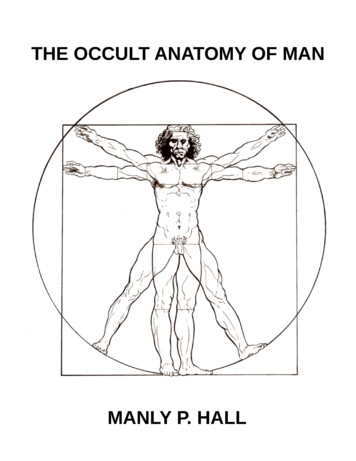
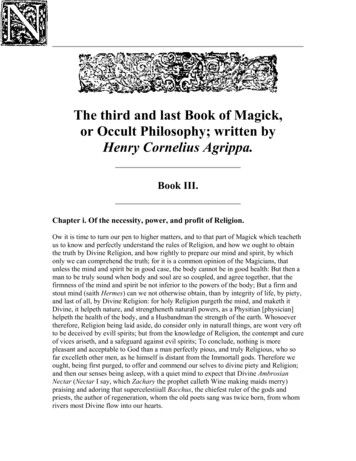
![Books/Pathfinder[Multi]/1st Edition/Campaign/Occult Realms](/img/6/occult-20realms.jpg)
